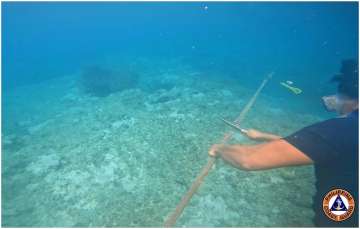Philippines removes 'hazardous' floating barrier installed by China in disputed South China Sea
Chinese coast guard ships have also blocked Filipino government vessels delivering supplies and personnel to Philippine-occupied shoals in the South China Sea.

The Philippines Coast Guard (PCG) on Monday said that it has successfully removed a "hazardous" floating barrier installed by the Chinese maritime forces aimed towards stopping Filipino boats from fishing in a nearby shoal in the disputed South China Sea.
Marking yet another confrontation between the two neighbouring countries, the Philippines had condemned the installation of the 300 m-long floating barrier southeast of the Bajo de Masinloc (BDM) shoal, also called the Scarborough Shoal, by the Chinese Coast Guard (CCG) on Sunday, saying that it was a violation of international law and the sovereignty of the country.
"In compliance with the instruction of the President, the Chairman, National Task Force for the West Philippine Sea (NTF-WPS), Sec. Eduardo Año, has directed the Philippine Coast Guard (PCG) to execute a special operation to remove the floating barrier that obstructed the Southeast entrance of Bajo De Masinloc (BDM)," said PCG spokesperson Jay Tarriela in a statement on platform X.
Tarriela reiterated that the barrier posed a hazard for navigation and was in complete violation of international law, while also hindering the conduct of fishing and livelihoods of Filipino fishermen. He also asserted that the BDM shoal is an integral part of the Philippines national territory.
"The decisive action of the PCG to remove the barrier aligns with international law and the Philippines’ sovereignty over the shoal. The PCG remains committed to upholding international law, safeguarding the welfare of Filipino fisherfolk, and protecting the rights of the Philippines in its territorial waters," said the PCG spokesperson.
Philippine National Security Adviser Eduardo Ano on Monday said that “the placement by the People's Republic of China of a barrier violates the traditional fishing rights of our fishermen.
China's response
Tarriela said earlier that the barrier found in the area was discovered by PCG and Bureau of Fisheries and Aquatic Resources (BFAR) personnel during routine maritime patrolling. Three Chinese Rigid Hull Inflatable Boats (RHIBs) and Chinese maritime militia's boat installed the barrier upon the arrival of BFAR boat near the shoal.
On the other hand, Chinese Foreign Ministry spokesperson Wang Wenbin said that Beijing has "indisputable sovereignty" over the shoal and its adjacent waters, which it considers as China's "inherent territory".
He accused a Philippine vessel of "trespassing into the waters" without China's permission and attempting to "intrude" into the lagoon. "China's coast guard took the necessary measures to stop and warn off the ship in accordance with the law, which was professional and with restraint," Wang claimed.
Additionally, four Chinese Coast Guard (CCG) vessels initaited 15 radio challenges to drive away the BFAR vessel and Filipino boats. The Chinese boats moved away after realising the presence of media personnel.
Confrontations between China and the Philippines
This is the latest confrontation in the South China Sea, one of the most hotly contested water bodies in the world. The Philippines said on Sunday that that the CCG vessels usually install floating barriers whenever they monitor a large number of Filipino fishermen in the area.
Last week, a Philippine BFAR ship and at least 54 Filipino fishing boats were ordered by four Chinese ships by radio to leave the territory, alleging that they were breaching Chinese and international law. The Philippines said that it was a routine patrol.
Philippines' claim over the 200-mile Scarborough Shoal lies was upheld by an arbitration decision in 2016 under the 1982 UN Convention on the Law of the Sea. However, China refused to recognise the 2016 arbitration ruling amid tense standoffs in the region.
Chinese coast guard ships have also blocked Filipino government vessels delivering supplies and personnel to Philippine-occupied Second Thomas Shoal, resulting in near-collisions that the Philippine government has condemned and protested.
Last month, the Chinese Coast Guard allegedly used a water cannon to block a Filipino supply boat from delivering a new batch of troops, food, water and fuel to the Second Thomas Shoal in the disputed waters.
Earlier, the PCG shared pictures of destroyed coral reefs in the South China Sea, accusing China of massive destruction in the area. "The continued swarming for the indiscriminate illegal and destructive fishing activities of the Chinese maritime militia in Rozul Reef and Escoda Shoal may have directly caused the degradation and destruction of the marine environment in the [West Philippine Sea] features," it said.
China claims ownership over virtually the entire strategic waterway despite international rulings that invalidated Beijing's vast territorial claims, such as that in 2016 by the Permanent Court of Arbitration, an international body based in The Hague. China rejects that ruling.
China's unsubstantied claims have put it in odds with the Philippines, Vietnam, Malaysia, Brunei and Taiwan and the situation has been regarded as an Asian flashpoint.
(with AP inputs)
ALSO READ | Philippines summons Chinese ambassador over water cannon incident in South China Sea